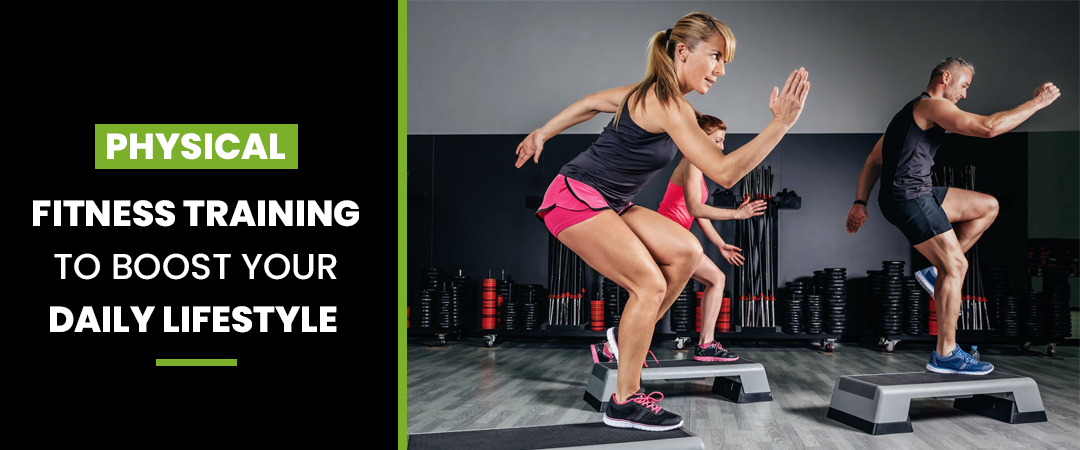
How Does Physical Fitness Training Boost Your Daily Life?
Introduction
Physical fitness is an essential aspect of a healthy lifestyle, and regular exercise can have a significant impact on your overall well-being.
Whether you’re looking to lose weight, build muscle, or simply improve your overall health, physical fitness training can help you achieve your goals. In this blog post, we’ll explore the many benefits of regular exercise and physical fitness training, and how it can help boost your daily life.
For general fitness, most adults should desire 10,000 steps per day. 10000 steps to miles are approximately 4.7 miles according to guz fitness.
From improved mood and energy levels to better sleep and reduced risk of chronic diseases, regular exercise is a powerful tool for promoting physical and mental well-being.
So, if you’re ready to take your health and fitness to the next level, read on to discover how physical fitness training can help you lead a happier, healthier life.
The Physical Benefits of Regular Exercise
The physical benefits of regular exercise are numerous and well-documented. Regular physical activity can help to improve muscle strength and endurance, cardiovascular health and function, flexibility, and range of motion.
It can also help with weight management, body composition, and bone density, as well as reducing the risk of injuries.
Additionally, regular exercise can improve overall physical fitness and performance, respiratory function and lung capacity, and even enhance your immune system. Following is the list of benefits of regular exercise.
- Increased muscle strength and endurance
- Improved cardiovascular health and function
- Increased flexibility and range of motion
- Better weight management and body composition
- Enhanced bone density and decreased risk of osteoporosis
- Improved balance and coordination
- Reduced risk of injury
- Increased overall physical fitness and performance
- Improved respiratory function and lung capacity
- Enhanced immune function
The Mental Health Benefits of Physical Fitness Training
Physical fitness training can have a powerful impact on mental health and well-being. Regular exercise has been shown to reduce stress and anxiety, improve mood and self-esteem, and enhance cognitive function and memory.
It can also help to increase focus and concentration while providing a sense of accomplishment and satisfaction. Additionally, regular physical activity can improve sleep quality and reduce symptoms of depression.
Furthermore, it can increase feelings of well-being and happiness, and give a sense of control over one’s own life. Finally, regular exercise can help to improve the ability to cope with life’s challenges.
How Exercise Can Improve Your Sleep and Energy Levels?
Exercise can have a significant impact on sleep and energy levels. Regular physical activity can help to regulate the body’s sleep-wake cycle, promoting deeper, more restful sleep.
Exercise can also improve the quality of sleep, helping to reduce fatigue and increase energy levels. Additionally, regular physical activity can help to reduce fatigue and increase energy levels, as well as improve daytime alertness and reduce daytime sleepiness.
It can also help to reduce insomnia and other sleep disorders by reducing stress and anxiety. Regular physical activity can also improve overall physical fitness, which can lead to increased energy levels.
As a result, including regular exercise in your daily routine can help you to feel more awake, alert, and energized throughout the day.
The Role of Physical Fitness in Preventing Chronic Diseases
Physical fitness plays a crucial role in preventing chronic diseases such as obesity, type 2 diabetes, heart disease, and certain types of cancer. Regular physical activity can help maintain a healthy weight, lower blood pressure and cholesterol levels, improve insulin sensitivity, and reduce inflammation in the body.
Additionally, physical fitness can improve overall mood and cognitive function, and can also help to reduce symptoms of depression and anxiety. It’s recommended that adults engage in at least 150 minutes of moderate-intensity aerobic activity or 75 minutes of vigorous-intensity aerobic activity per week, along with muscle-strengthening activities at least two days per week.
Incorporating Physical Fitness Training into Your Daily Routine
Incorporating physical fitness training into your daily routine can be challenging, but it is essential for maintaining good health and preventing chronic diseases. Here are a few suggestions to help make it easier:
Make a schedule: Set aside specific times each day for physical activity. This can be in the morning, during lunch, or after work.
Find an activity you enjoy: Choose an activity that you enjoy, such as swimming, biking, dancing, or walking.
Start small: Begin with a short, manageable workout and gradually increase the duration and intensity over time.
Incorporate physical activity into your daily tasks: Take the stairs instead of the elevator, walk to work or to run errands, or park farther away from the entrance of a store or office.
Find a workout buddy: Having a friend to workout with can make physical activity more enjoyable and increase accountability.
It’s important to remember that consistency is key, so it’s better to start with a shorter and simpler routine and progress slowly than to burn out quickly. It’s also important to check with a doctor before starting any new fitness regimen, especially if you have any existing health conditions.
Tips for Making Physical Fitness Training a Sustainable Habit
Making physical fitness training a sustainable habit requires a combination of planning, consistency, and motivation. Here are a few tips to help make it a sustainable habit:
Set realistic goals: Set specific, measurable, achievable, relevant, and time-bound (SMART) goals for yourself. This will help you stay motivated and track your progress.
Make it a part of your daily routine: Incorporate physical activity into your daily routine, such as taking the stairs instead of the elevator or going for a walk during lunch.
Track your progress: Keep a log of your progress, whether it’s the number of steps you take in a day, the distance you run, or the weight you lift. This will help you see how far you’ve come and keep you motivated.
Find a workout buddy: Having a friend to workout with can make physical activity more enjoyable and increase accountability.
Mix it up: Mixing up your routine will help prevent boredom and allow you to challenge different muscle groups.
Reward yourself: Reward yourself for reaching your fitness goals, whether it’s with a new workout outfit or a massage.
Be consistent: Building a habit takes time, so be consistent and don’t give up if you miss a day or two. Just get back on track as soon as possible.
Listen to your body: If you’re feeling sore or tired, take a rest day or try a different type of workout.
Remember, the most important thing is to find activities you enjoy and make it a consistent part of your life. It’s also important to check with a doctor before starting any new fitness regimen, especially if you have any existing health conditions.
Conclusion
In conclusion, incorporating physical fitness training into your daily routine can greatly enhance your overall well-being. Regular physical activity can help prevent chronic diseases, improve overall mood and cognitive function, and reduce symptoms of depression and anxiety.
It’s important to make fitness a sustainable habit by setting realistic goals, incorporating physical activity into your daily routine, tracking your progress, finding a workout buddy, mixing it up, rewarding yourself, being consistent and listening to your body.
Remember that consistency is key and it’s better to start with a shorter and simpler routine and progress slowly than to burn out quickly. It’s also important to check with a doctor before starting any new fitness regimen, especially if you have any existing health conditions.


You May Also Like

The Health Benefits of Maintaining an Adequate Level of Physical Fitness
February 6, 2023
How to Deal With Obstacles That Can Affect Your Journey at the Gym?
July 4, 2023
